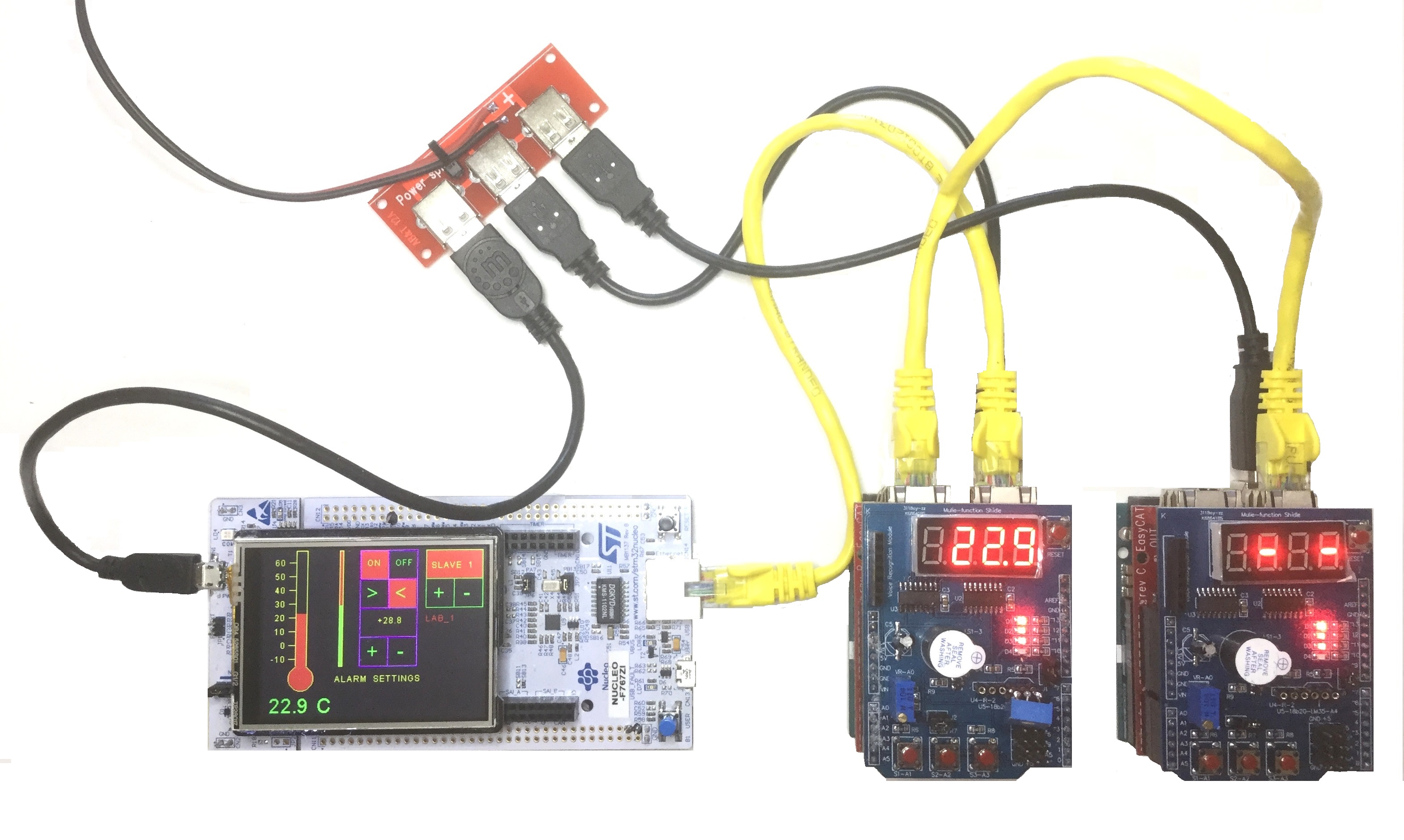SOEM EtherCAT Master library for STM Nucleo F767ZI
Dependents: EasyCAT_LAB_simple EasyCAT_LAB_very_simple EasyCAT_LAB
- This repository contains the SOEM (Simple Open EtherCAT® Master) library by rt-labs, that has been ported in the
 ecosystem by AB&T Tecnologie Informatiche.
ecosystem by AB&T Tecnologie Informatiche.
- It has been developed for the EasyCAT LAB , a complete educational and experimental EtherCAT® system, composed of one master and two slaves .
- The EasyCAT LAB is provided as a kit by AB&T Tecnologie Informatiche, to allow everybody to have an educational EtherCAT® system up and running in a matter of minutes.
Warning
- Currently only the Nucleo STM32F767ZI board is supported.

osal/osal.cpp
- Committer:
- EasyCAT
- Date:
- 2019-06-11
- Revision:
- 0:543d6784d4cc
File content as of revision 0:543d6784d4cc:
/*
* Licensed under the GNU General Public License version 2 with exceptions. See
* LICENSE file in the project root for full license information
*/
#include "mbed.h"
#include <osal.h>
#include <config.h>
uint64_t tick = 0;
uint64_t last_tick = 0;
#define timercmp(a, b, CMP) \
(((a)->tv_sec == (b)->tv_sec) ? \
((a)->tv_usec CMP (b)->tv_usec) : \
((a)->tv_sec CMP (b)->tv_sec))
#define timeradd(a, b, result) \
do{ \
(result)->tv_sec = (a)->tv_sec + (b)->tv_sec; \
(result)->tv_usec = (a)->tv_usec + (b)->tv_usec; \
if ((result)->tv_usec >= 1000000) \
{ \
++(result)->tv_sec; \
(result)->tv_usec -= 1000000; \
} \
} while (0)
#define timersub(a, b, result) \
do { \
(result)->tv_sec = (a)->tv_sec - (b)->tv_sec; \
(result)->tv_usec = (a)->tv_usec - (b)->tv_usec; \
if ((result)->tv_usec < 0) { \
--(result)->tv_sec; \
(result)->tv_usec += 1000000; \
} \
} while (0)
#define CFG_TICKS_PER_SECOND 1000000
#define USECS_PER_SEC 1000000
#define USECS_PER_TICK (USECS_PER_SEC / CFG_TICKS_PER_SECOND)
int gettimeofday_(struct timeval *tp, void *tzp)
{
//tick_t tick = tick_get();
uint32_t actual_tick = us_ticker_read();
tick += (actual_tick - last_tick);
last_tick = actual_tick;
//tick_t ticks_left;
uint64_t ticks_left;
tp->tv_sec = tick / CFG_TICKS_PER_SECOND;
ticks_left = tick % CFG_TICKS_PER_SECOND;
tp->tv_usec = ticks_left * USECS_PER_TICK;
return 0;
}
int osal_usleep (uint32 usec)
{
wait_us(usec);
return 0;
}
int osal_gettimeofday(struct timeval *tv, struct timezone *tz)
{
return gettimeofday_(tv, tz);
}
ec_timet osal_current_time (void)
{
struct timeval current_time;
ec_timet return_value;
gettimeofday_ (¤t_time, 0);
return_value.sec = current_time.tv_sec;
return_value.usec = current_time.tv_usec;
return return_value;
}
void osal_timer_start (osal_timert * self, uint32 timeout_usec)
{
struct timeval start_time;
struct timeval timeout;
struct timeval stop_time;
gettimeofday_ (&start_time, 0);
timeout.tv_sec = timeout_usec / USECS_PER_SEC;
timeout.tv_usec = timeout_usec % USECS_PER_SEC;
timeradd (&start_time, &timeout, &stop_time);
self->stop_time.sec = stop_time.tv_sec;
self->stop_time.usec = stop_time.tv_usec;
}
boolean osal_timer_is_expired (osal_timert * self)
{
struct timeval current_time;
struct timeval stop_time;
int is_not_yet_expired;
gettimeofday_ (¤t_time, 0);
stop_time.tv_sec = self->stop_time.sec;
stop_time.tv_usec = self->stop_time.usec;
is_not_yet_expired = timercmp (¤t_time, &stop_time, <);
return is_not_yet_expired == false;
}

